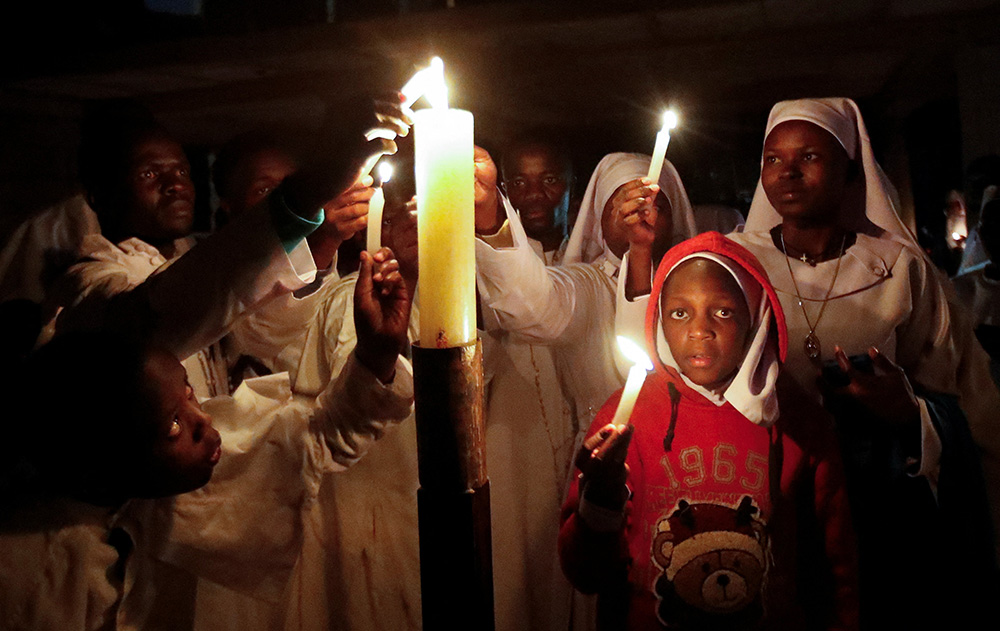
Worshippers light the paschal candle during the Easter Vigil at the St. Joanes, Legio Maria of African Church Mission within Fort Jesus in Kibera district of Nairobi, Kenya, March 30. (OSV News/Reuters/Monicah Mwangi)
On Friday, we walked to Calvary with Hans Küng as our guide on the passion and death of Jesus, his reflections in On Being a Christian pointing us to the critical, yet often scuttled, fact: Jesus died utterly forsaken, not only by his followers but by his Father in heaven, the one upon whom he had called with such great intimacy. God did not come down and save his own son from the ignominy of the cross.
Today, let us walk with Küng to the tomb. He explains that while he insisted on nonmiraculous explanations for other biblical miracles, here no such recourse is possible. Küng examines the discrepancies among the scriptural accounts of Easter, as well as our modern tendency to psychologize the faith, specifically mentioning "Feuerbach's suspicion that we are merely projecting our own needs: that the resurrection is nothing more than the satisfaction of man's longing for a direct assurance of his personal immortality."
Here, Küng betrays his own limitations, failing to engage the most obvious objection to the projection theory, one famously articulated by the late, great Msgr. Lorenzo Albacete: We do not experience our bodies as a metaphor, psychological or otherwise, so why would the resurrection of the body serve as the basis of anyone's faith?
Nonetheless, what becomes clear to Küng, and to those who consult this wonderful book, is that the resurrection of Jesus is decisive, for the first disciples and for us. Just as Jesus' death distinguished him from the founders of the other great world religions, so too does his resurrection change the very content of the Christian faith. Küng writes:
After leaving this man to die in complete isolation, how did it come about that his followers not only clung to his message under the impact of his "personality," his words and deeds, not only summoned up their courage some time after the catastrophe to continue to proclaim his message of the kingdom and the will of God — for instance, the "Sermon on the Mount" — but immediately made this person himself the essential content of the message?
How did they come to proclaim, therefore, not only the Gospel of Jesus, but Jesus himself as the Gospel, unintentionally turning the proclaimer himself into the content of the proclamation, the message of the kingdom of God into the message of Jesus as the Christ of God?
All scholars of religion recognize that the origin of Christianity is found here, in the empty tomb.
Advertisement
Jesus' resurrection is not like the myths common in the world of his time. Küng mentions Hercules who was taken up into Olympus and Dionysius who died and was revived.
"These were nature cults in a new form: constructed out of the natural rhythms of sowing and growth, sunrise and sunset, coming to be and passing away, projected by the wishes and desires of men longing for immortality," Küng notes. "Everywhere here myth is at the beginning and — somewhat as in the Old Testament — is given a historical form. With Jesus it is the other way round."
It is the crucified who was raised from the dead. Seeds and sunsets are not crucified. The suffering and death Christ endured are not part of a normal life cycle. And if he was not raised, the verdict of the world, rendered on Good Friday, stood. If the tomb was not empty, the Sermon on the Mount and all of Jesus' other teachings are so much foolishness.
We Christians may argue about which of Jesus' many ethical teachings are most important in our own time and circumstances. We may disagree about how certain scriptural passages, how even the words of Jesus, are to be understood. We may possess a high Christology or a low Christology. What unites us is this belief that the tomb was empty and, just so, that Jesus is himself the criterion by which we must judge ourselves.
We Catholics wonder why people leave the church. Some cite the clergy sex abuse crisis. Some think the reforms of the 1962-65 Second Vatican Council curtailed the necessary cultural buttresses of the faith. Some think we have become too accepting of modernity and others that we are not accepting enough.
We now have brunch and soccer practice and a host of other things to do on Sunday mornings. We are affluent, self-sufficient and like to be our own criterion.
Such discussions are important to be sure, but one thing seems undeniable at Eastertide. If all of us truly believed and behaved as if the resurrection of Jesus was decisive, not just for him, but for us, our churches would be overflowing.








